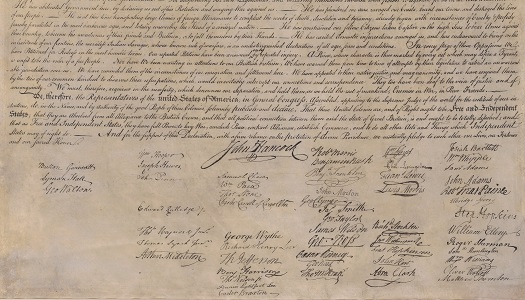 Click for Large Hi-Res Image of the Full Declaration…
Click for Large Hi-Res Image of the Full Declaration…As we celebrate our Nation’s Independence, we as Irish Americans should take special pride in the day. Nine of the signers of the Declaration of Independence were of Irish descent, including the only non-Protestant, Charles Carroll. The Secretary of the Continental Congress was from Derry, the first printing was done by a printer from Tyrone, and it was read in public for the first time by the son of an immigrant from Wexford. At a minimum, 25% (some estimates go as high as 40%) of Washington’s Army was Irish including a large number of its officers. The Colonies most successful Naval Captain was Commodore John Barry of Wexford, who, at the war’s end, commanded the last remaining ship of the Continental Navy, USS Alliance and would after the war be the Father of a new United States Navy.
George Washington wrote “Ireland, thou friend of my country in my country’s most friendless days, much injured, much enduring land, accept this poor tribute from one who esteems thy worth”. His adopted son George Washington Parke Custis went further: “When our friendless standard was first unfurled for resistance, who were strangers [foreigners] that first mustered ‘round its staff when it reeled in the fight, who more bravely sustained it than Erin’s generous sons? Who led the assault on Quebec [General Montgomery, Donegal] and shed early luster on our arms, in the dawn of our revolution? Who led the right wing of Liberty’s forlorn hope [General Sullivan, the son of Cork immigrants] at the passage of the Delaware [the Battle of Trenton]? Who felt the privations of the camp, the fate of battle, or the horrors of the prison ship more keenly than the Irish? Washington loved them, for they were the companions of his toil, his perils, his glories, in the deliverance of his country.”
As we celebrate our justifiable pride as American and remember with gratitude the opportunities this nation gave our forebears that was gratefully repaid with service and loyalty, we should dedicate ourselves that the story of Irish America is told. The contributions of Irish Americans, along with many other groups, were intentionally omitted from our nation’s history, and sadly while great progress has been made in rectifying the injustice to other groups, the Irish are still undervalued, underreported and underacknowledged. We as Hibernians need to be telling the story of the Irish in America, no one else will. We can’t just talk abstractly of “Irish Pride” or wearing it on our hats, we should be demonstrating it.
Secondly, there is a great lesson to be learned from the Declaration of Independence. John Adams was likely the most unpopular man in Congress. Some of the signers were aspiring Aristocrats; others were Artisans. Edward Rutledge was 26, Benjamin Franklin 70. Charles Carroll was a Catholic amongst many fervent denouncers of the Catholic Church. Yet, they put all this aside to come together in common cause and do what had never been done before: for Colonies to declare their independence and form a new nation. They realized their difference paled in comparison to the greater good. There is much that our Order and our Nation could learn from their example